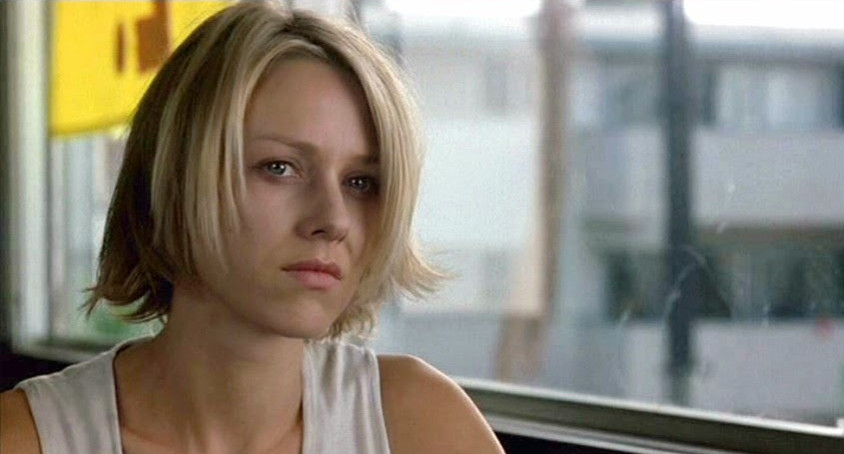
Despite the seeming impenetrability of much of David Lynch’s filmography, he is widely regarded as one of the most original and talented (and also divisive) filmmakers of the past forty years. Countless interpretations of his work have fuelled endless debates among fans, critics and casual observers alike.
Is he an authentic genius or an intentional enigma? That all depends on what you think you’re seeing on screen and the meaning you assign it. Most of his films are left wide open to interpretation by the viewer, as Lynch generally abhors explaining his work to anyone.
Throughout his career, David Lynch’s output has remained strikingly original as no two films are really the same, and yet the majority of them all have a distinct and recognizable style: the dreamlike imagery, the haunting scores, the non-linear randomness of events, the deeply unsettling dread that seems to permeate, well, everything – and many of these motifs all appear within the same film, albeit with a different presentation.
The host of characters within his films, no matter whether it is the central figure of the narrative or someone who simply seems to appear randomly and without an immediately recognizable purpose, are quite often – much like the very films they exist within – the epitomization of the word ‘idiosyncratic’.
Below are ten of the most striking, absolutely cannot miss them performances in the films of David Lynch.
10. Willem Dafoe in Wild At Heart
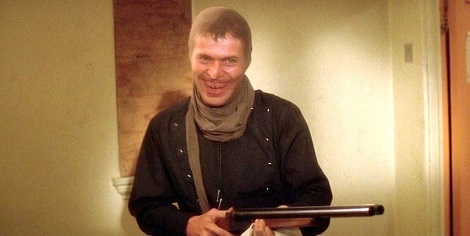
A truly frightening confluence of ghastly teeth, hair trigger temperament and terrifying unpredictability, Bobby Peru (“like the country”) is pure nightmare material, full stop. From the moment he is introduced to young lovers Sailor and Lula after they’ve become stranded in the dusty Texas backwater of Big Tuna, he radiates palpable dread and the worrisome promise of danger yet to come – the audience knows immediately that nothing positive will come from their associating with him.
In a long and memorable career littered with wildly divergent roles, the character of Bobby Peru is dually recognized as being between one of the most memorable roles Willem Dafoe has ever played, and also one of the most memorable villains in any David Lynch film. His portrayal of Bobby is a testament to his ability as an actor as he disappears into and inhabits the character with a level of conviction that simultaneously astounds and horrifies.
Everything Bobby is can be easily seen right on the surface, there are no internalizations here – he is a sexually predatory, psychotically evil, black leather clad force of nature. His leering grin, distorted and pulled tightly within a nylon stocking worn over his head during the feed store robbery is an unshakeable, haunting image not soon forgotten.
9. Isabella Rossellini in Blue Velvet
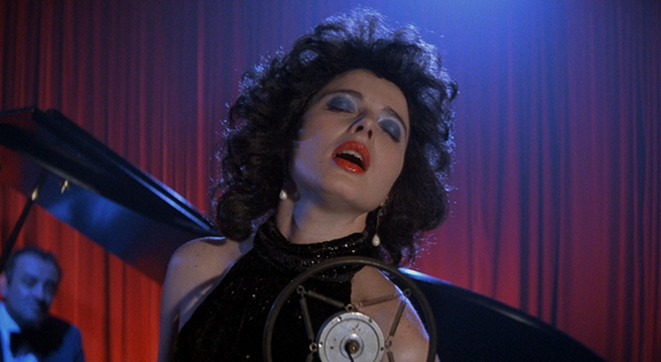
Upon its initial release in 1986, Blue Velvet was deemed “one of the sickest movies ever made” (by none other than the late Roger Ebert), and it provoked many reactions from both critics and general audiences alike. Whether the film was being praised for its observations on motive and behavior or vilified for its perceived shock value and exploitation, an inarguable fact was that it contained one of the strongest cinematic performances of that year.
As the downtrodden lounge singer who seemingly must submit to the perversions and brutality of the psychotic Frank Booth (Dennis Hopper, see below), Isabella Rossellini’s Dorothy Vallens initially elicits a sympathetic response from the viewer, as she is brutally victimized and humiliated. But as the audience discovers, she is not entirely a victim of Frank – she enjoys the sadism, too.
A controversial figure then and now, Dorothy divides audiences as they realize she is not Frank’s prey but rather his emotionally compromised equal. She fulfills the dual roles of both victim and unhealthy parental figure for him, with both existing in the context of a masochistic relationship.
Rossellini’s performance here remains, some thirty years on, as a high point in her cinematic career, and is made even more remarkable considering that it was only her fourth film role. Rossellini’s immersion into the character of Dorothy compels and repulses in equal measure as she vacillates between willing and dominant partner and helpless prey.
8. Ray Wise in Twin Peaks: Fire Walk With Me
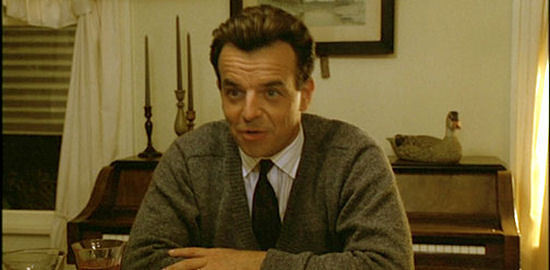
Ray Wise has appeared in hundreds of different productions in both television and film during the course of his career, but it is his performance as Leland Palmer that is the most recognizable. Wise once described the film as, “…more like a nightmarish dream”, and his portrayal of Leland correlates to this interpretation seamlessly.
Leland is, upon introduction, an upstanding, respected figure in the community and a doting, all American dad. But as the mystery deepens and his layers are slowly peeled away, what is revealed is, as Wise opined, truly nightmarish.
While Laura Palmer may have been the character that facilitated the pivotal murder mystery of the plot, it is her father Leland who ends up being the central figure when the stunning conclusion is finally reached – Leland has been an unwitting host to a demonic spirit named Bob, and under this guise has been sexually abusing his own daughter for years.
Wise delivers the revelatory blow with a powerfully intense and tragic performance, and his portrayal of Leland places him firmly in the upper echelons of memorable performances within David Lynch’s entire filmography and remains as his most enduring and memorable role to date.
7. Nicolas Cage in Wild At Heart
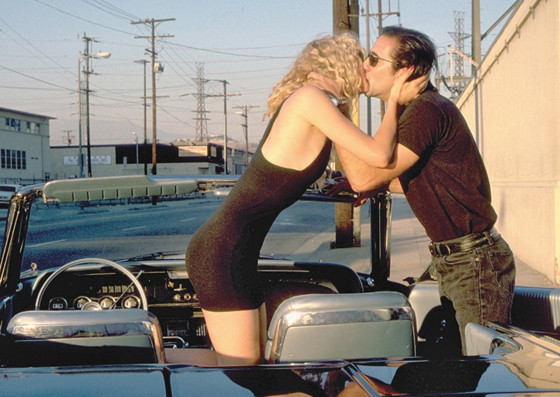
While today Nicolas Cage may be regarded as somewhat of a punch line for sleepwalking his way through a seemingly endless stream of VOD genre mediocrity for the majority of the last decade, there once was a time when he was considered to be one of the most promising actors on the rise in Hollywood.
The role of Sailor Ripley in Wild At Heart arrived during this promising period, and as such, it is a marvelous and somewhat under appreciated turn by the actor, and in retrospect stands as a career highlight. The role of Sailor was indeed quite advantageous for Cage, as he was able to fully utilize his burgeoning method actor sensibilities and exercise them to their outer most boundaries relatively early on in his career.
While his portrayal of Sailor Ripley does embody many of the acting tics and traits that audiences would later come to associate with him in a more often than not parodical context later on, his performance in Wild At Heart is both electrifying and honest, while remaining devoid of any caricature.
Cage inhabits this character visually and vocally with aplomb, informing Sailor with a volatile, passionate impetuousness. His signature snakeskin jacket, martial arts inspired dance moves and southern drawl aren’t meant to be humorous, and in unison they end up personifying not only the character but the spirit of the film itself. A near perfect match of role with actor, the character of Sailor Ripley was quite simply owned by Cage (or perhaps it was vice versa).
6. Dennis Hopper in Blue Velvet
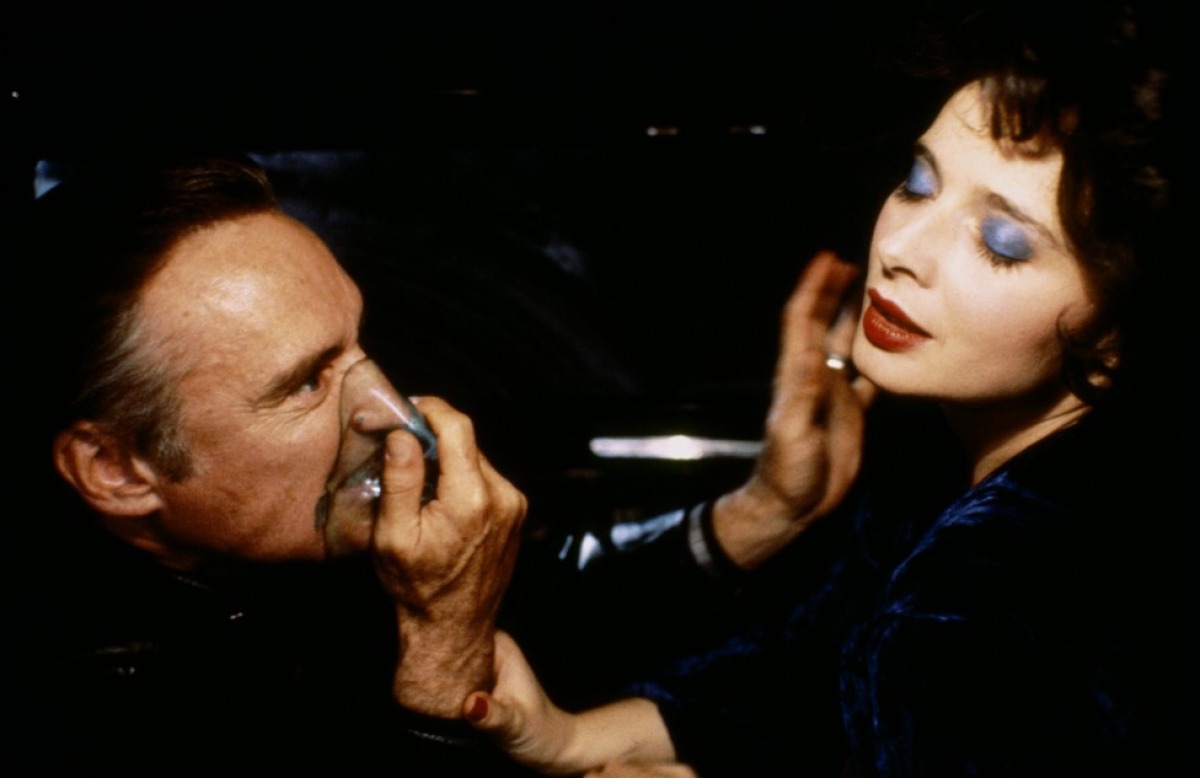
Although the character of Frank Booth has become famous for his quotability (“Heineken? Fuck that shit”, “Let’s hit the fuckin’ road”) in the years that have passed since Blue Velvet was released, his initial introduction to film audiences was absolutely terrifying. This was a role that Hopper seemed practically born to play, as he brought Frank to life with a visceral intensity that outshone most everything he’d done in his career to that point.
Notably, Frank Booth was Hopper’s first role upon completing a stint in rehab and his performance served to re-establish his reputation as an actor and re-invigorated his career in the process.
Dennis Hopper as Frank is (in much similarity to Willem Dafoe as Bobby Peru) a force of nature; he exists in the recesses of our nightmares and is all too terrifyingly real when we are introduced to him in the film as he sexually abuses Dorothy, fuelling himself with nitrous oxide via his infamous and iconic oxygen mask.
Almost childlike one moment, frighteningly and explosively intense the next, Frank Booth is never explained but is instead experienced; his manic, wild eyed, profanity laced energy is completely captivating while also equally grotesque and frightening.
His sadism towards Dorothy seemingly alternates between being the victim and the aggressor and the viewer cannot help but to watch the raging monster and his violent outbursts and perversions with fascination and awe, terrified of what they’re seeing yet unable to look away.
David Lynch has introduced many memorable villains throughout his directing career, but very few of them remain as simultaneously unsettling and riveting as Frank Booth.